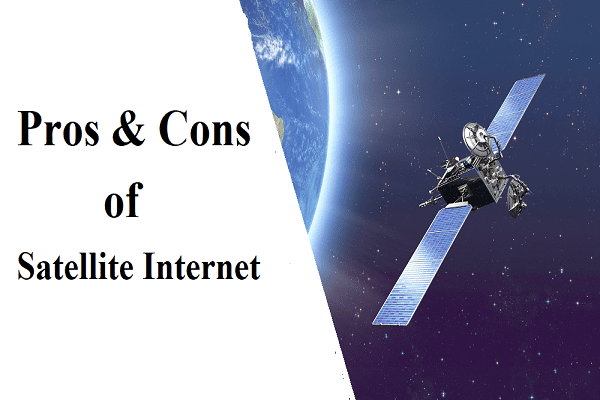
Hearing a lot of buzz about satellite Internet? Before you get persuaded and sign up for one, you should always take a look at satellite Internet pros and cons and make the right choice.
Since its debut, satellite Internet has grown significantly. At a first glance, you will be moved by the pros of satellite Internet. Some of the eye-catching advantages include faster than dial-up, virtually available everywhere in the country (remote and rural areas), convenient to use, a growing number of providers, and quick recovery post-disaster. The popularity of satellite Internet continues to grow in areas where wired Internet options like DSL and cable are less common. However, there are some downsides as well. Satellite Internet is expensive and often behaves slow. It further suffers from latency issues as well. High latency, high jitter, data limits, geographical limitations, etc. (varies by carrier) strike the mind at once.
What Are the Pros and Cons of Satellite Internet?
We need to expand this comparison – satellite Internet pros and cons – so that you get a better view and make the right decision – should you sign up for satellite Internet or not?
Advantages of Satellite Internet –
- Wider Reach: Are you residing in a countryside area or a small town that is not well-equipped with traditional telecom infrastructures like phone wiring, fiber, cable, or DSL service? Choosing a satellite service would be a great choice. This is the biggest edge of this wireless service over other Internet types as it is available everywhere in the United States.
- Cost Effective: Can you imagine Internet companies building out cable infrastructure to every home in the world (over 40% of the world’s population has no Internet access), which would end up costing billions of dollars? Let’s take this for instance – the US Telecom Department estimated that approximately $27,000 (per mile) would be spent just by laying fiber optic cable. As compared to this staggering figure, satellite Internet connectivity saves a lot of bucks while compromising delivering the Internet to everyone in the remotest areas.
- Internet Users Living in Regions Prone to Natural Disaster: Places like Florida where hurricanes are a normal sight to behold, it shouldn’t be a great idea to avail of the cable Internet connection and wait for the authorized staff to take a long time to fix the connections.
- Speeds Have Improved: In recent years, satellite Internet users have expressed much satisfaction with the speed. Some Internet Service Providers are already catering to your needs by offering 25 Mbps or more speed. As per the FCC reports, most Internet providers meet the users’ expectations by delivering up to 140% of the speed they promise.
- Convenience for Whole Family: In this pandemic time, everyone is locked inside their house. Work from home has become new normal with more and more companies are asking their employees to stay indoors and work. This means both you and your spouse would require the Internet to send emails, attend video conferences, and more. Missing deadlines might put you in trouble. You cannot ask your spouse to give up on the wired Internet connection so that you can accomplish your task. This is when the convenience of satellite Internet cannot be ignored. It can connect to multiple devices.
Disadvantages of Satellite Internet –
Is satellite Internet all roses and chocolate cake? You will get to know very soon.
- High Latency: Due to long-distance – satellite orbiting the Earth, your home’s router, and land-based servers – your satellite Internet might experience high latency. So, latency is basically the delay noted between your request of data, i.e. opening a webpage, and when the page is displayed on the device. This is going to get higher as the satellites are placed so high.
- Data Restrictions: Your Internet Service Provider often restricts your data usage. ISPs would ensure your usage of data stays between 20 GB to 50 GB. Exceeding this figure would cost you a hefty amount.
You need to make sure how important your work is and what services are available to you before settling down for any service.

